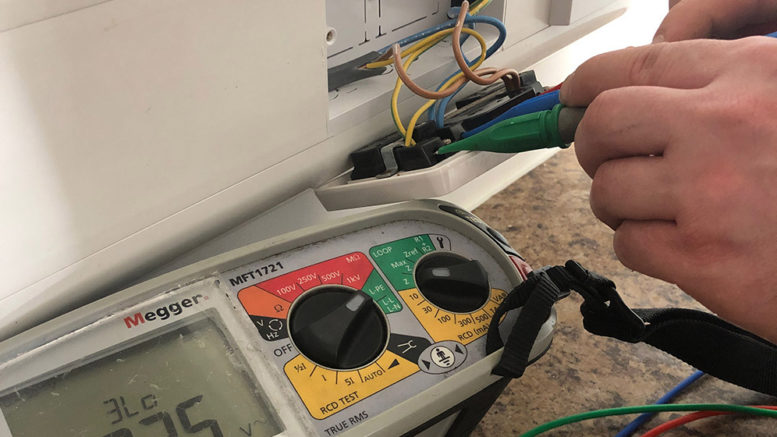Landlords must ensure that electrical circuits, sockets, light fittings, cookers, and other electrical installations in their rental properties are safe. As of 1 July they must have a certificate confirming this. Sharon Betton reports.
Carbon monoxide poisoning can make the victims very ill, with a multitude of symptoms which could indicate brain damage, and, in the worst cases, can result in death. This is why I would never argue about the value of gas safe regulations and yearly inspections. Electrical safety inspections are another matter.
I found the calls for a standardised inspection of electrical installations unnecessary. A private sector landlord was anyway required to ensure the safety of electricity circuits. Major problems would be quite apparent without the need for a fully qualified electrician to check.
Provided no-one had taken a hammer to a plug socket, or allowed a child to push screwdrivers into it, electrics should stay safe. An indicator of a problem could be lights short-circuiting regularly; no tenant wants to live with problematic lighting, so is unlikely to ignore that. But still, despite my arguments, the accreditation scheme I used to work for called for certification of electrical systems for at least 12 years.
It appears that campaigning by accreditation schemes and Shelter, finally led to the Electrical Safety Standards in the Private Rented Sector (England) Regulations 2020, being introduced in April 2020. They applied to all new tenancies from 1 July 2020 and now, from 1 April 2021, to all tensncies.
The regulations put a duty on landlords to have their properties inspected every five years, by a ‘qualified’ person, able to undertake the inspection and testing required and, if further investigation or remedial work is found to be needed, able to bring the installations to the appropriate standard in accordance with Electrical Safety Standards.
A private landlord who grants or intends to grant a tenancy for a particular property must: ensure that appropriate electrical safety standards are in place whenever the property is tenanted – it hardly makes sense to insist upon this when a property is unoccupied: damp could affect the installation.
Also, the landlord must ensure all electrical installations in the premises are inspected and tested at regular intervals by a qualified person; presumably, the qualified person will have undertaken training, which will have cost him.
The test itself will obviously cost – you!
Landlords must have ensured the first inspection and testing has been carried out by 1st April 2021 or, in the case of properties newly brought to the rental market, before a tenancy is granted.
An inspection at ‘regular intervals’ means at intervals of no more than five years (unless you as landlord see something which gives you concern) or where the most recent report requires inspection and testing to be at intervals of less than five years, at the intervals as specified in the report.
Following the inspection and testing required, a private landlord must obtain a report from the person conducting that inspection and test, which gives the results of the inspection and test and the date of the next inspection and test. He or she must also supply a copy of that report to each existing tenant of the residential premises within 28 days of the inspection and test. And a copy of that report must be supplied to the local housing authority within seven days of receiving a request in writing for it from that authority.
Landlords must retain a copy of the report until the next inspection and test is due (giving a copy to the person carrying out the next inspection and test). Landlords must also supply a copy of the most recent report to:
- any new tenant of the property, before it is occupied; and
- provide a copy of the report to prospective tenant within 28 days, should they request it in writing.
Where a report indicates that a private landlord is or is potentially in breach of the duty of electrical safety and further investigative or remedial work is required, the private landlord must ensure that that further investigative or remedial work is carried out by a qualified person in no more than:
- 28 days, or
- the period specified in the report if less than 28 days (where the installation is in a potentially dangerous state, tenants will not be expected to wait up to 28 for remedial action and a more rapid repair needed).
These timescales will start on the date of the inspection and testing.
Where remedial work is required, a private landlord must:
- obtain written confirmation from a qualified person that the further investigative or remedial work has been carried out and that the electrical safety standards are met; or that further investigative or remedial work is required;
- supply a copy of the report which showed further investigative or remedial work to each tenant of the property within 28 days of completion of the investigative or remedial work; and
- supply a copy of the report which required the further investigative or remedial work to the local housing authority within 28 days of completion of the further work.
Where further investigative work is carried out and it is found that further investigation is needed, the private landlord must repeat the actions already taken in respect of further investigative or remedial work.
A person is a prospective tenant in relation to residential premises if that person-
- asks for any information about the premises from the prospective landlord to help him decide whether to rent the premises;
- asks to view the premises to help in deciding whether to rent those premises; or
- makes an oral or written offer, to rent those premises.
I still do not feel this additional legislation is necessary. It could be said that the majority of risk of electrical safety standards not being met is often down to misuse by the tenant. However, you must comply with the legislation, which seems another layer of bureaucracy and expense laid on the private sector landlord. Will social landlords agree to meet the same standard?








